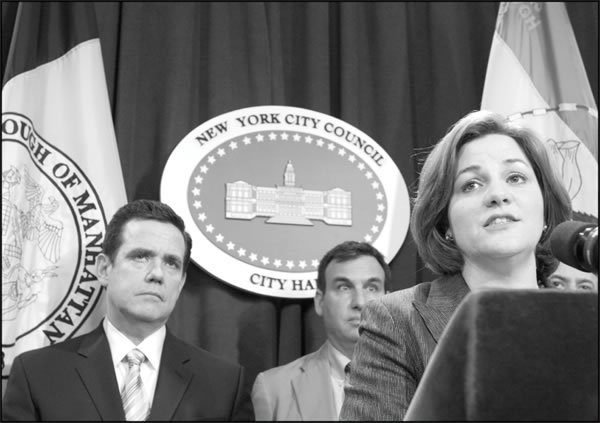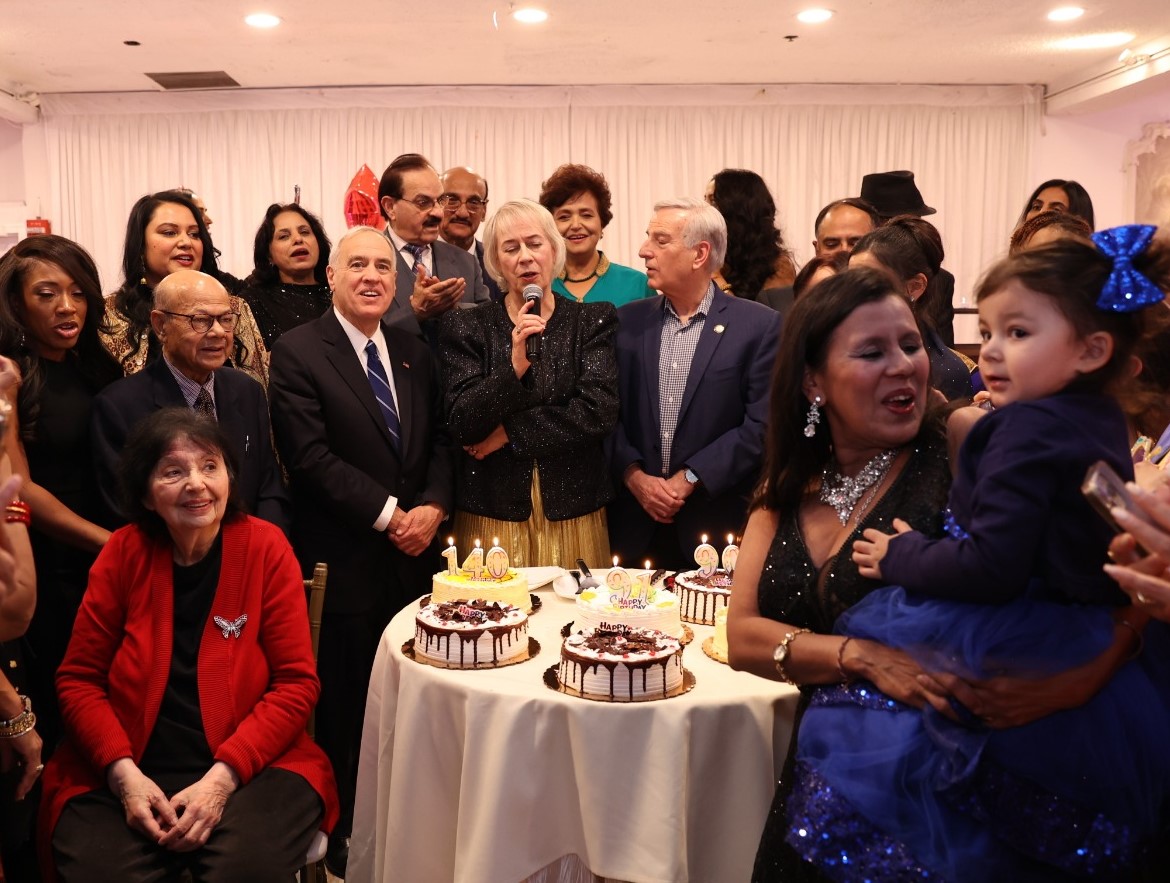BY PAUL SCHINDLER
In a press conference aimed at turning the corner on a week-long controversy over revelations that more than $17 million had been budgeted for fictitious organizations during the past eight years and then appropriated at the City Council speaker’s discretion to other organizations, Christine C. Quinn announced reforms that would definitively end that practice and also subject a larger pool of roughly $20-$25 million in discretionary funds explicitly budgeted for the speaker’s office to a formal “request for proposal” (R.F.P.) process.
Flanked by officials from two government watchdog organizations— Dick Dadey, executive director of Citizens Union, and Gene Russianoff, senior attorney at the New York Public Interest Research Group (NYPIRG) — the speaker, on April 11, also announced that she will recommend to the mayor’s Charter Reform Commission that it create an independent compliance officer at the Council, who would report directly to the speaker, but not serve at her or his pleasure.
The independent compliance officer would serve a four-year term, timed to straddle the tenure of two consecutive speakers, and could be fired only for cause.
The speaker’s effort to shift attention to her proposed reforms ran into problems on April 16, when the U.S. Attorney’s office announced the indictment of two members of Brooklyn member Kendall Stewart’s staff on charges of embezzling $145,000 in city funds. Though the indictment suggested no wrongdoing on anyone else’s part, it explained the fictitious budget entities in some detail and alleged that $14,000 of the stolen funds were originally designated in the budget for two of those bogus groups.
At a press conference, Michael Garcia, the U.S. attorney for New York’s Southern District, said his office’s investigation will continue. “We will see where that leads,” he said.
Asked by reporters whether the indictment proves that appropriations from the fictitious groups were less benign than she had maintained — the speaker’s office had said all of the money had gone to legitimate non-profit groups — Quinn declined comment, pending resolution of the federal investigation.
The speaker’s proposal even earlier came under attack from some of her Council colleagues.
Quinn — who would be the first openly lesbian or gay New Yorker to mount a serious campaign for mayor if, as expected, she runs next year — took pains to emphasize that the reforms she announced were not only a response to the recent budget irregularity revelations, first reported in the New York Post, but also consistent with her commitment since assuming her post in January 2006 to greater transparency in city government.
Terming the steps she laid out “historic reforms,” Quinn said, “Let me be clear, this is not the first announcement we have made about reform and it will not be the last announcement we make about reform.”
Building on an earlier reform that requires Council member requests for appropriations to be specified in the budget with the name of the legislator seeking the funding, rather than having them lumped into a single line item, as had been the practice, Quinn pledged that all data related to those requests and appropriations would soon be available in a searchable database, that would be linked to the city clerk’s office, which has information on lobbying activities related to city grantees.
Dadey, whose group had been widely quoted during the previous week expressing deep concerns about the budget tricks that have come to light, offered Quinn praise not only for the newly announced initiatives, but also for her overall record as speaker.
“Citizens Union has been pleased to work over the past couple of years with reform-minded individuals like Mayor Bloomberg and Speaker Christine Quinn,” Dadey said, even as he underscored that his group had been “disturbed last week to learn of what had been a several-year practice of hiding money.”
Russianoff, noting that he has “watched the New York City government for the past 25 years,” which he said has given him an understanding of the difference between reform and posturing, said, “The package here today is the real thing.”
With roughly a dozen other Council members on hand, Quinn got a vote of confidence from at least some of her colleagues. Brooklyn Council member David Yassky acknowledged that the accounting mess “posed a challenge to the credibility of the Council budget process,” but argued that with the new package of reforms, Quinn had “surmounted” those problems.
Since the April 11 announcement, however, Quinn has come under sharp criticism from a number of other Council members not on hand last Friday, upset she had not briefed them on the proposed reforms. Several argued that placing greater controls on discretionary spending reduced the prerogatives of the Council; if the R.F.P. process Quinn plans for the speaker’s discretionary funds are applied as well to member items generally, the freedom Council members have in funding projects in their own districts could be sharply reduced. News reports had Quinn in phone conversations and meetings with Council colleagues throughout the weekend and Monday to shore up her support on the proposed reforms.
On April 15, however, the Daily News quoted Queens Council member Peter Vallone, Jr., the former speaker’s son, saying, “I would say the proposal is dead.”
Several questions from the press at last week’s news conference focused on why the Council speaker had not moved earlier on the reforms she announced — when the issue of bogus entities in the budget came to her attention late last fall, rather than only in the days after they were exposed publicly. Quinn’s response each time boiled down to her view that reform has been an ongoing priority since she first became speaker.
Dadey spoke up to say that when his group met with Quinn last spring they were pleased by her reforms but felt more needed to be done. He stressed that discussions about steps toward further transparency had remained ongoing since then.
Quinn was also asked why she had not gone public with disclosure of the bogus entities when she learned of them last year, to which she responded that her staff was more focused on getting that information to the city Department of Investigation and the U.S. Attorney’s office.
Pressed to explain where she thought the money her office appropriated last summer out of the reserve accounts — months after she ordered that the practice of setting aside reserves be stopped — had come from, Quinn said some questions cannot be answered while official investigations remain open, citing in that regard as well any discussion of how the bogus accounting got started in the first place.
The most curious moment in the press conference came when the speaker seemed to suggest that the mayor’s staff had been told of the phantom entities in the budget at the same time the Council staff informed the two investigatory bodies. When a reporter noted that Bloomberg seemed genuinely surprised at the revelations, Quinn fell back on a more general assertion that “at different parts of the process where we felt different city entities needed to be made aware, we made them aware.”
Hours after Quinn made her announcement April 11, the city’s Law Department confirmed that in its capacity as attorney to the Council it was in fact consulted late last year, but given attorney-client confidentiality, the mayor’s office was not informed of those discussions.
Bloomberg also issued a written release late Friday, saying, “Speaker Quinn has put together a broad and impressive array of reforms that will make her budget more open and more transparent and build on the already-impressive foundation of reforms she’s brought about as speaker.”
On April 12, the New York Times reported that in addition to hiring the law firm of Sullivan & Cromwell to assist in cooperating with federal and city investigators, as Quinn previously disclosed, the Council has also hired Lee S. Richards III, a criminal attorney who is a former federal prosecutor, to represent the speaker. Both Richards and Sullivan & Cromwell will be paid out of city funds.



































